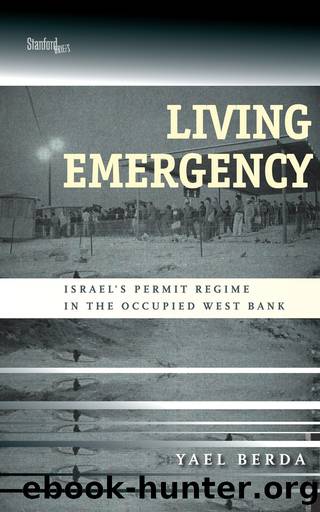Living Emergency by Yael Berda

Author:Yael Berda [Berda, Yael]
Language: eng
Format: epub
Tags: Political Science, Security (National & International), World, Middle Eastern, Public Policy, Immigration
ISBN: 9781503602823
Google: DjkXtAEACAAJ
Publisher: Stanford University Press
Published: 2018-01-15T01:09:43+00:00
The length of a sentence determines the number of years of classification as a criminal security threat. If a person receives a sentence for up to one year, he is restricted from entry for three years; up to five years, he is restricted for five more years; and more than five years, he can be banned for up to twenty years. Since 1970, more than six hundred thousand Palestinians have served a prison sentence, so the limitations on entry into Israel apply to a substantial part of the population. In 2006, the police security classification was a restriction that prevented entry into Israel, permits for the seam zone, and permits to work in settlements, so spatially it was more confining than the Shin Bet security classification. The criteria also imposed multiyear restrictions on people who had investigation files opened, even in cases of entering Israel âillegallyâ with a permit but during closure.
Both the Shin Bet and police security classifications that had not been removed by the DCO could be lifted only through a petition to the High Court.
SECRET EVIDENCE: SHIN BET AND THE HIGH COURT
In most cases, the only possible intervention in classification cases was the appeal to the Supreme Court, as High Court of Justice, for judicial review of the decisions of the Civil Administration (which were actually the decisions of the Shin Bet). One of the only forms of resistance to the permit regime, petitioning the High Court meant shifting the arena of the decision from the colonial government in the West Bank to the central government via the Supreme Court. The schedule and administrative principles operating in Israel are then applied to the case. The petitions forced the central government to address the practices of the colonial governors and the Civil Administration, and in turn, the Civil Administration had to show some compliance with administrative principles. However, while lawyers and international organizations expected the judicial oversight to create more accountable practices in the Occupied Territories according to international human rights law,22 over time the administrative practices spilled over seamlessly from the organizations running the occupation in the West Bank to departments of the Israeli government in Jerusalem and Tel Aviv.
The Shin Bet officials are invisible in the flow charts of the bureaucracy of the occupation; they are physically seen only by the Palestinians selected by them for an interview. However, they remain obscured from the eyes of lawyers and activists involved in attempts to have the restriction removed. In this regime of perpetual emergency, the Shin Bet representatives are the sole decision makers on a personâs categorical fate. The encounter of the Shin Bet with the subjects classified as security threats is a place where the sovereign, who defines the state of exception de facto,23 meets face-to-face with the victim, a space where only the maker of the decision and the immediate subject of the decision can exist. When the court intervenes in the executive decision, the pure sovereign-like power of the military commander over the subject is mediated by a semblance of rule of law.
Download
This site does not store any files on its server. We only index and link to content provided by other sites. Please contact the content providers to delete copyright contents if any and email us, we'll remove relevant links or contents immediately.
| Bahrain | Egypt |
| Iran | Iraq |
| Israel & Palestine | Jordan |
| Kuwait | Lebanon |
| Oman | Qatar |
| Saudi Arabia | Syria |
| Turkey | United Arab Emirates |
| Yemen |
Empire of the Sikhs by Patwant Singh(23084)
The Wind in My Hair by Masih Alinejad(5095)
Rise and Kill First by Ronen Bergman(4788)
The Templars by Dan Jones(4689)
The Rape of Nanking by Iris Chang(4211)
12 Strong by Doug Stanton(3548)
Blood and Sand by Alex Von Tunzelmann(3203)
Babylon's Ark by Lawrence Anthony(2676)
The History of Jihad: From Muhammad to ISIS by Spencer Robert(2628)
No Room for Small Dreams by Shimon Peres(2368)
Inside the Middle East by Avi Melamed(2356)
The Turkish Psychedelic Explosion by Daniel Spicer(2356)
Gideon's Spies: The Secret History of the Mossad by Gordon Thomas(2350)
Arabs by Eugene Rogan(2299)
The First Muslim The Story of Muhammad by Lesley Hazleton(2271)
Come, Tell Me How You Live by Mallowan Agatha Christie(2260)
Bus on Jaffa Road by Mike Kelly(2159)
1453 by Roger Crowley(2030)
Kabul 1841-42: Battle Story by Edmund Yorke(2029)
